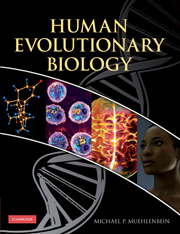Preface
Published online by Cambridge University Press: 05 August 2012
Summary
In review of a different text, Moses Hadas (1900–1966) remarked that “this book fills a much-needed gap.” Unlike the text he was referring to, the topic of human evolutionary biology deserves no such gap in our understanding. To identify one's place in nature and to appreciate how human evolution has been guided by the same evolutionary principles that guide other organisms is humbling and necessary. We are products of evolution, and this is reflected throughout our biology and behaviors.
The purpose of our text is to provide thorough and modern reviews of a wide range of pertinent aspects of human evolutionary biology and contemporary human biological variation. The history of research on human biological variation is a long one, and includes studies on general human adaptability, variations in growth patterns, body sizes and shapes, genetic diversity, and race concepts. More recently, the study of human biology has included analyses of reproductive physiology and behavior within evolutionary and ecological frameworks. Other advancements include the science of evolutionary medicine, in which evolutionary research on health and disease is used to elucidate medical research and practices.
The text before you is different from most others. Unlike traditional texts on evolutionary biology, our book focuses specifically on humans and the application of evolutionary theories on understanding modern human variation and adaptability. Unlike traditional texts on human biology, our book does not include detailed descriptions of all human physiological and anatomical systems.
- Type
- Chapter
- Information
- Human Evolutionary Biology , pp. ix - xPublisher: Cambridge University PressPrint publication year: 2010



